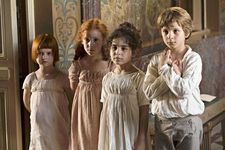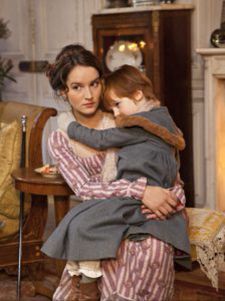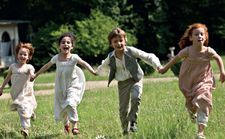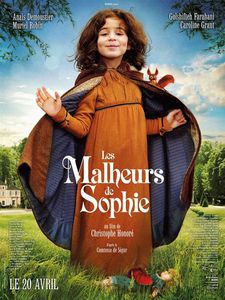_600.jpg) |
| Christophe Honoré with photographs of Federico Fellini's 81/2 star, Sandra Milo Photo: Anne-Katrin Titze |
Christophe Honoré's vividly mischievous Sophie’s Misfortunes, based on the Comtesse de Ségur's books, Les Malheurs De Sophie and Les Petites Filles Modèles, has a score by Alex Beaupain and David Sztanke, influenced by music the director himself liked as a child. Golshifteh Farahani (Madame de Réan), Anaïs Demoustier (Madame de Fleurville) and Muriel Robin (Madame Fichini) play the mothers in Sophie's (Caroline Grant) world. She and her playmates, Camille (Céleste Carrale), Madeleine (Justine Morin) and Paul (Tristan Farge) show us that the dawn belongs to children.
 |
| Madeleine, Camille, Sophie, and Paul in Sophie’s Misfortunes |
Christophe explains a reference to me from Jean Vigo's Zéro De Conduite, says Sophie’s Misfortunes isn't John Lasseter's Toy Story, and happily notes that doing a film for children helped him "clean up" his cinema by getting rid of "bad over-complicated ideas." Inside Lincoln Center's Furman Gallery at the exhibition Fellini 81/2 In Color, photographs by Paul Ronald, curated by the director of Les Rencontres D’Arles, Sam Stourdzé, we continued our conversation.
Anne-Katrin Titze: There's moss and kissing a kitten and you start your film with the girl waking up [Sophie] while her mother [Madame de Réan] is still asleep. I think this is a great pull for the audience because everybody remembers that - what that felt like as a child. When you were the only one who was awake and the parents were still asleep. The world belongs to you. Is that the reason you picked the scene for the start?
Christophe Honoré: You're right, dawn belongs to children. That's one of the important things in the Comtesse de Ségur. The Comtesse de Ségur finds her way to writing scenes in which children get rid of the adults. That's what she builds many of the episodes on in the first volume, Sophie's Misfortunes. Which are ones where the children escape from adults.
 |
| Madame de Fleurville (Anaïs Demoustier) with her daughter Madeleine |
In the second volume, however, The Model Little Girls [Les Petites Filles Modèles], the adults are no longer being escaped from. The adults are missing. Simply because they're dead. Sophie's mother and father are dead. So that creates a completely different relationship to the world. It's no longer a relationship of joyous exploration but of solitude. And naturally, these are very different feelings.
AKT: You bring things together with the feelings for the doll. In the first part, the doll, "the horrible doll" that is left outside to melt or otherwise mishandled, comes back on this mini barge. Both scenes are linked like that in the Comtesse de Ségur.
CH: Yes.
AKT: I want to talk about the doll a little bit because Sophie's handling of it is so much the opposite of animistic. She sees it as a doll. As a dead doll. Whereas many other children's stories give another life to inanimate objects.
CH: It is not Toy Story at all!
AKT: It's the opposite of Toy Story. To distinguish inanimate objects from living beings is something children learn early on. She's a mature little girl in that respect, is she?
CH: Maybe it's a question of maturity. The question of the doll is a very complex one. One can think - and this is kind of a classic rhetorical figure regarding the doll - that the doll mirrors Sophie. This is true in the Comtesse de Ségur and this is certainly how I used it in the film, which is that the doll is made to suffer extensively. She is tortured and one can think that this announces what Sophie is going to go through later.
 |
| "You're right, dawn belongs to children. That's one of the important things in the Comtesse de Ségur." |
That's why it was important for me to have the funeral for the doll in the middle of the film. In a way, that is also the funeral of Sophie as a wild child. Then in the second part of the film she comes and digs up the doll. And that's Sophie's resuscitation as a reasonable child.
AKT: I loved that scene - the funeral. The choreography of the children felt so real.
CH: It's very strange with that scene. There's actually a reference in the scene. I don't know if you remember, in Jean Vigo's Zéro De Conduite, there's a slow-motion pillow-fight with the feathers floating. Naturally, it's a distant reference but I wanted to use it to create a kind of epiphany with that scene.
AKT: You gave Sophie red shoes. Another reference?
CH: Yes. Sometimes I can't resist the pleasure of being a cinephile. And when I have an idea of thinking, oh, other filmmakers have had it before, but that's no reason to deprive myself of it.
AKT: It works well even without the cinematic reference by simply the Andersen tale. Pride, vanity are in these shoes. I was thinking while watching the movie - I don't remember this thought ever crossing my mind like this before - that I would have loved this film as a child. I know I would have loved it when I was little. I do love it now but that's different. Putting myself back in time, I am also certain that I would have been terrified by the burning boat.
 |
| Les Malheurs De Sophie poster |
CH: Actually, I tried to build the film in this sense in that direction. You know, I have written many children's books and I've asked myself the question of this addressed literature, this specific literature that seems to be reserved for kids but with the idea that it could also touch adults.
And that adults with this literature have a kind of nostalgic relationship. I think the film works like that as well. I really believe that five, six-year-old kids can experience the film and enjoy it completely in the present. While adults might think that they're not getting everything from the film, the children, because they're not enjoying that nostalgic relationship.
AKT: I see what you mean.
CH: To go a little bit further with your idea, what was very pleasant for me in this film is that each time I had to make a choice as a director, a choice in the mise-en-scène, I would always force myself to think in terms of or be very attentive to the fact that a six year old had to understand this direction choice. In a sense, I think that that really cleaned up my cinema.
It got rid of a lot of the bad over-complicated ideas and led to a simplicity of expression that, I think, allows a more simple emotion than we find in my earlier films. And I think this is a real quality.
AKT: I can tell you of two things that speak to exactly that. Lazy summer afternoons and the boredom that only a child feels - you captured that perfectly. The other one was a memory triggered. I was four or five and I was feeding my friend Simone dog food. I felt terribly caught by your scene when Sophie is serving the dog water to her little friends. I felt shame. I was blushing during the screening in the dark because I felt caught, found out by you.
Read what Christophe Honoré had to say on childhood misbehavior in Sophie’s Misfortunes.
The uniFrance and Film Society of Lincoln Center's 22nd edition of Rendez-Vous with French Cinema in New York, runs through March 12. Screenings will take place at the Walter Reade Theater, Lincoln Center.





















